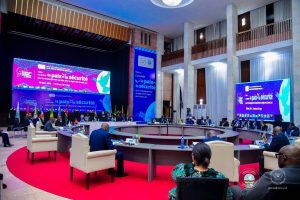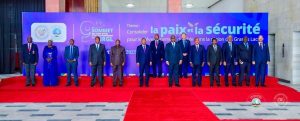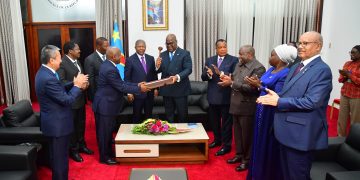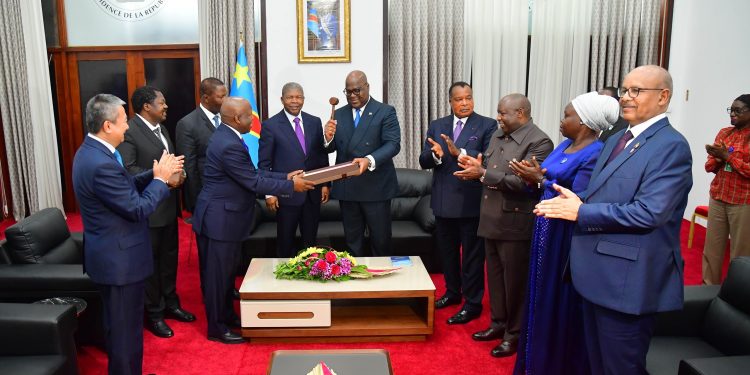Kinshasa — The Democratic Republic of Congo’s President Félix Tshisekedi has officially taken over the chairmanship of the International Conference on the Great Lakes Region (ICGLR) during the organisation’s 9th Ordinary Summit of Heads of State and Government, held on 15 November 2025 at the Palais du Peuple in Kinshasa.
Convened under the theme “Consolidating Peace & Security for Sustainable Development in the Great Lakes Region,” the summit brought together five Heads of State from Angola, Burundi, the Central African Republic, the DRC, and the Republic of Congo. Uganda was represented by Hon. Huda Oleru, Minister of State for Defence in charge of Veteran Affairs, on behalf of President Yoweri Kaguta Museveni.
This year’s summit was particularly significant as it marked the first in-person gathering in five years, the last having been held virtually in 2020. A major development was the appointment of Dr Mubita Luwabelwa of Zambia as the new Executive Secretary of the ICGLR, replacing Ambassador João Caholo of Angola.
UN Calls for De-escalation and Humanitarian Access
During the opening ceremony, Mr Huang Xia, the UN Secretary-General’s Special Representative, called for an immediate cessation of hostilities in eastern DRC and underscored the need for guaranteed humanitarian access for affected populations.
“Uncompromising on sovereignty and non-aggression”
In his acceptance speech, President Tshisekedi pledged a principled and inclusive approach to his new leadership role.

He stated that his presidency would be “uncompromising on the principles of sovereignty, territorial integrity, non-aggression, and the rejection of any support for armed groups,” adding that he would remain “resolutely open to dialogue with a view to finding lasting political solutions that are inclusive of women, youth, local authorities and communities.”
Uganda Highlights Regional Security Threats
Representing Uganda, Hon. Huda Oleru expressed appreciation to the outgoing ICGLR chair and Secretariat for what she described as their “steadfast leadership, encouraging dialogue and bringing parties together to advance peace and security.”
She emphasised Uganda’s ongoing concern over the continued threat posed by the Allied Democratic Forces (ADF), saying the group endangers not only Uganda but regional stability as a whole.
Hon. Oleru also thanked the DRC for its role in Operation Shujaa, the joint military effort against the ADF, and wished President Tshisekedi success as the incoming chair.
She urged member states to take decisive action against terrorism and armed groups: “There is a need for the ICGLR to support the Expanded Joint Verification Mechanism (EJVM) to decisively neutralise the armed groups.”
Oleru called on the Summit to recognise the expanding security challenges in Sudan and South Sudan, insisting that the ICGLR must be actively involved in exploring concrete solutions.

Push for Socio-Economic Transformation
Beyond security, Hon. Oleru stressed the importance of economic development as a foundation for long-term stability.
She called on member states to prioritise regional economic integration, strengthen intra-regional trade, investment, and connectivity infrastructure, and implement programmes focused on job creation, youth and women’s economic empowerment, skills development, and poverty reduction.
She warned against the misuse of natural resources: “Availability and abundance of natural resources should be a blessing and not a curse, and resources should not be used to fund armed groups.”
Kinshasa Declaration Adopted
The Summit later proceeded into a closed session that resulted in the adoption of the “Kinshasa Declaration”, which will guide regional peace initiatives going forward. The declaration aligns ongoing regional efforts with the Doha and Washington processes, as well as the African Union initiative led by President Faure Gnassingbé of Togo.
The 9th Ordinary Summit reaffirmed the ICGLR’s commitment to regional stability, dialogue, and economic transformation as key pathways toward sustainable peace in the Great Lakes Region.











